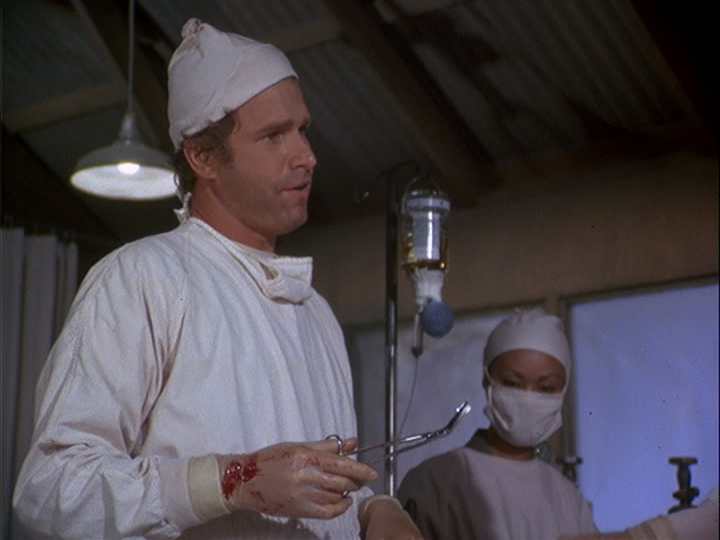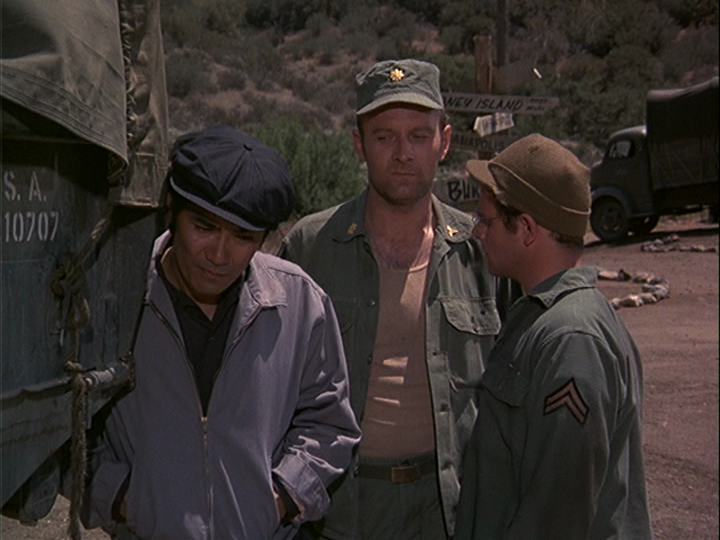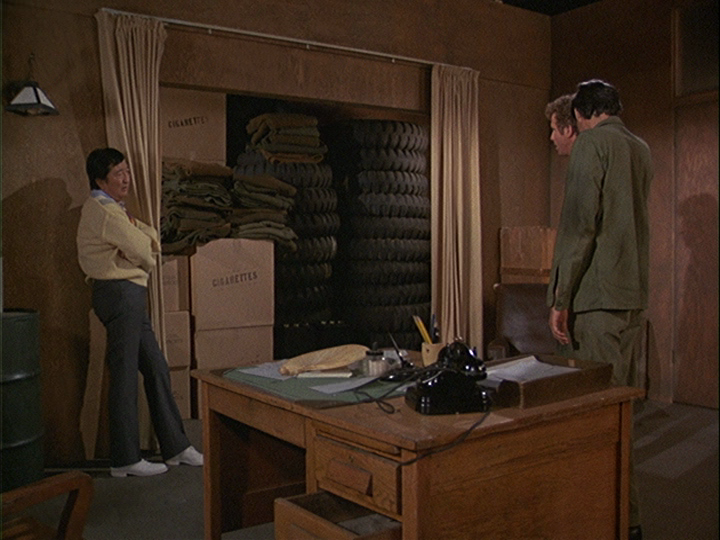It’s been a while since my last M*A*S*H post; writing about a series which ended over 25 years ago doesn’t always feel like the freshest news on the planet. But I keep coming back to it. M*A*S*H is something which is part of the fabric of my life, like it or not. (When the San Franscisco Giants won the National League championship last year and social media rang out with “The Giants Win the Pennant!” it was the M*A*S*H loudspeaker I heard echoing in my head, not the iconic 1951 radio broadcast.) It ran for 11 years – and many of those years it was broadcast concurrently with earlier seasons in syndication – and therefore had a huge cultural impact on several generations. And looking at this long-running TV show now, I note not only how much the world has changed, but how I have changed, too.
The storyline of this episode is that black marketeers have been stealing necessary medical supplies and only our fearless surgeons Hawkeye and Trapper care enough about saving patients to do anything about it. There’s a smattering of standard M*A*S*H devices, drunken and clueless Henry being duped for the greater good, Margaret and Frank getting steamy over the thought of a court-martial for Hawkeye and Trapper, Radar secretly running the whole operation, and the handful of “contact with local Koreans” tropes which will become part of the fabric of the M*A*S*H universe in episodes to come. American dancehall music (translated into Korean) plays while young girls smile suggestively at the doctors as the local boys strip the jeep of everything useful outside…
It all begins with an operating room sequence. While the pilot episode contained no images of blood for fear of offending prime-time viewers, by the time this episode was shot, the doctors have small amounts of red splattered on their gloves and gowns. These O.R. scenes never included a laugh track in order to illustrate the seriousness of war injuries and death. The lack of laugh track doesn’t mean a lack of wisecracks, but without the canned laughter, the jokes feel hollow and disrespectful. And I am pretty sure that was the point.
The M*A*S*H boxed set of DVDs includes the option to turn the laugh track off for the entire episode, so I gave it a try. Aside from throwing off the pacing because of the pauses for laughter which doesn’t come, it also makes it harder to ignore the unabashedly sexist and racist humor in the script. It’s like the difference between someone muttering a derogatory epithet as you pass them on the street and standing around in a group of people who are laughing at a distasteful joke.
While the show doesn’t come right out and excuse or promote racism, the Korean characters are all depicted as sneaky cheats interested only in making money and willing to expend human life for personal gain. There are scores of fake accents, and even a good old “we all look alike,” line tossed in for good measure.
US Army generals and Korean criminals mirror each other in the way they value power and personal gain over saving lives. Throughout the series, the Army Brass often redeem themselves (while disappointing Houlihan and Burns) by letting our heroes get away with their hijinks either after being swayed by Hawkeye’s Righteous Rage or because of his superior skills as a surgeon. However, there is little to similarly mitigate the negative portrayal of the Korean people.
While it is likely accurate to say that many people in war-torn areas of the world will do whatever possible to carve out a better life, I feel certain that if this show were filmed today, there would be at least one sympathetic Korean character in this episode among the caricatures with exaggerated accents and a marked affinity for symbols of American affluence. Later in the series, we do start to see some cracks in this hackneyed negative representation. We also begin to see less blatant sexism, both through the developing of Margaret Houlihan’s character beyond its original single dimension and through the storylines becoming more complex and allowing for more than the simple formulaic “doctor cracks jokes, doctor laments loss of life, doctor chases a piece of tail.”
Whether that change came from the drive of the writers and actors to capitalize on their success by pushing personal ideologies, or if the changes are simply endemic of society’s evolution over a decade – I can’t say for sure. But I’ll be looking for clues as I go on watching.
M*A*S*H Revisited explores the past and the present — personal and societal — using the hit TV show as a frame. I will continue to pontificate on how much (and often, how little) has changed as I go episode-by-episode through all 11 seasons. Unless I get tired of it. You can read the previous articles in this series here.



